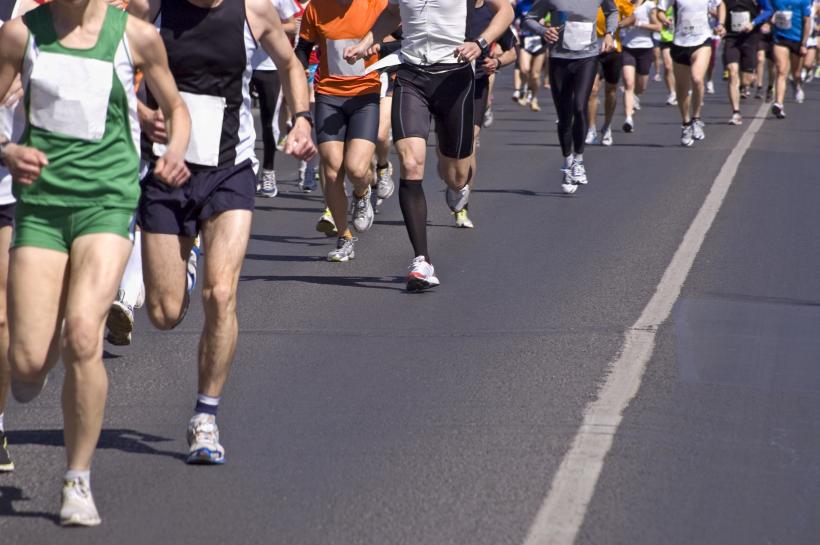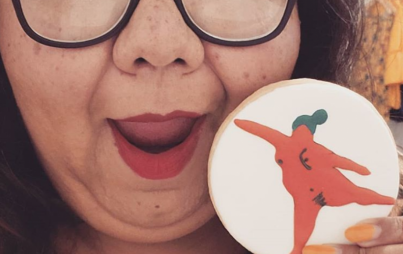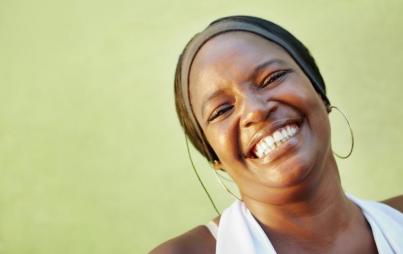
Thinkstock
I couldn’t hold it anymore—I abandoned my modesty. The sheer discomfort of running with a sloshing bladder at its limits forced me to shelve my fear of an accidental poop-pee without toilet paper and with the added dicey-ness of wearing tiny, tiny shorts. I pulled to the side of the trail, dropped my now well-wedgied, miniscule shorts, and peed.
And kept peeing.
I cordially nodded to several passing runners whom I had now exposed myself to, and at that point, around 24 miles into my inaugural trail ultramarathon, the sweet relief of a finally empty bladder gave me much needed hope. “Maybe I can actually do this, maybe I’ll finish. That guy said it’s easier from here, so if I just shuffle on, I can do this!”
That guy by the way? He lied. He fucking lied to me.
Going Beyond The Marathon
When you tell your friends and family that you're running a marathon, it's like it's suddenly your birthday. There's an outpouring of excitement, support and encouragement coupled with the "wow, I'm winded at 5 miles!" not-so-gentle questioning of the do-ability of what you're about to undertake. But overall, it's a party. Finish or not, you're attempting a MARATHON! And that drive and dedication is something to be applauded and celebrated.
But add a handful of miles to 26.2? Those miles are apparently crazy miles, since they push you past “admirable” and into “questionable judgment." Even more so when you have residual injuries from being run over by a car.
You see, I was an athlete. I used to train for competition and times. I am now a past-tense athlete. I train for finishing and enjoying the journey.
When you’re grateful for something as simple as working legs, it upends your perspective, making you more aware of the multitude of simple, ubiquitous blessings you’re lucky enough to enjoy every single day. I no longer compete with others or opinions or finish lines—I compete with myself. And I’ve found nothing as awe-awakening as carrying yourself, under your own strength, through every single moment of something you felt you “couldn’t” do.
I have shown myself, at moderate paces I’ve now mostly accepted, that limitations and doubt are stupid. If you take care of yourself, listen to your body and take your time, you’ll surprise yourself with what you can complete and overcome.
So here I was, two emotion-releasing road marathons later, obsessively reading and re-reading the website for Trail Factor—a trail 50K in my hometown. One day on an impulse, I finally pulled the trigger: I paid the entry fee. Being a generally frugal person still digging out of the financial hole of medical bills and lost income, a non-refundable financial commitment was like signing in blood. There was no going back.
I started the training process I’d come to love and added in some wow-this-is-significantly-more-challenging trail jaunts. But as it does, life sometimes got in the way, and I’d only completed a long run of 20 miles prior to race day. That meant I’d have a full 11 miles of uncharted physical territory the day-of, plus a freshly acquired blister on the ball of my right foot.
On top of mileage and blister concerns, I learned that there was a four-hour cut-off at 19 miles—reach that distance by that time or they’d pull you from the course. With my pacing limitations, a time-based cut-off instilled in me a deep sense of doubt and inadequacy that was jittering through my whole body as I walked toward the white tents of the starting line.
I picked up my numbered bib, stocked up on gooey energy aids, taped my right foot, and waited, bouncing foot to foot with excitement and anxiety. There was no more thinking, no more preparing. This was it.
The Starting Line
The first lesson of ultramarathons—it’s not a marathon.
I’m used to seeing people of all ages, abilities and gear quality in the starting corrals. These people were far more homogenous—thin, fit, focused and decked out in the finest sweat-wicking fabrics and split-monitoring wrist computers. When I started up conversations, there was far less “this is my first time” and far more “this is my training run for an upcoming 50 miler.” At first this was intimidating, then it was freeing—there was no keeping up with this crowd, which meant there was no pressure. Somebody has to be last, and if I made the looming 19-mile cut off, I’d happily take that spot!
I started preparing myself. Snacks? Check. Water bottle belt filled with personalized, homemade energy drink? Check. IPod charged and stocked with inspirational tunes? Check. Foot blister taped and ready for a beating? Check.
My traditional mental techniques weren’t going to get me through the strains of 31 miles and 4,000-plus feet of elevation gain. I created a new mantra: “I’m just on my way to the start.” It was a phrase that resonated with me, encouraging a view of every moment and mile as a pressure-free, leisurely beginning. Stay present. Stay mindful.
The atmosphere of the trail would prove solitary and free of bearings. There would be no markers, no encouraging crowds, only a handful of aid stations with varied spacing, and something I hadn’t really thought about—no port-a-potties. Perhaps if I had considered it sooner, I would have had time to get in line to empty my already noticeably-filled bladder prior to the start . . .
As we neared our launch, the race organizers started shouting thanks to various people and groups. Nervous energy was buzzing all around me. Some people were smiling and bouncing excitedly, some staring blankly forward (likely arranging their mental game), others prepping their data recording, face down to their wrist monitors. We’d have to loop down a little further, the announcer said, to space out our starts because there were too many of us for the too-narrow entry point. This would add a tiny bit more distance. I tried not to think about it.
Then the countdown, then the launch, then the huddled bumbling and spreading out of the field, then . . . we were off and running. We were running an ultramarathon!
. . . and we were running really fast . . .
Hills, Broken Dreams, Bloody Footprints And Triumph
My assessment of the group turned out to be correct—most of these people were beasts. Our starting pace was blistering—literally. I felt my foot blister tugging precariously on the tape surrounding it. If the tape comes off, I thought, I’m screwed. I needed to slow down—to save my energy and my foot. I started looking ahead for a wider section of trail where I could slow down without impeding the herd.
I hopped and sidestepped roots and rocks, flowing speedily through the dense muteness of the woods. It was beautiful and it was incredibly fun. “I’m on my way to the start. I’m just on my way to the start.” I turned the corner of a switchback and a wider, mountainous stretch of trail presented itself. The realities of the enormous elevation gain I’d face throughout this morning began to sink in.
I pulled to the side and I climbed. And climbed. And climbed. How long is this first hill? How did I not notice this on the elevation maps of the course? Turns out it was around two miles—one of the longest hills of the day. It proved an appropriate intro to the suffering that was to come.
From the peak of that hill, the following miles blurred in hurried joy. My legs were fresh and my tape was holding. I smiled uncontrollably. I was going to do this! I was going to smoke that cut-off! I turned another corner to head into an incredibly steep descent near mile 10. I was going fast. I was going really fast. I was going too fast.
I landed forcefully with my right foot and . . .
Rrrriiipp!
The tape protecting my sizeable blister caught my shoe and tore my foot wide open. The pain was incredible.
I could feel the warmth of pooling blood when I started an in-motion assessment of the situation. This hurt. It was going to hurt with every foot strike. Could I run 20-plus more miles like this? Would it lead to permanent damage? After some testing and gait adjustment, I decided it was safe to try. My music became distraction from the pain, and I soldiered on. With my now significantly slower pace, the thought of missing the time cut-off began to creep back in.
My throbbing, bleeding foot was one thing, but my bladder refused to be ignored. I kept seeing blissfully relieved runners emerge from the trees, but alas, I was not as skilled at finding a spot to call my Honey Bucket. I didn’t want to potentially poop in front of everyone, so I clenched and kept on running.
Who knows how many hobbly, full-bladdered miles later, after building a smoldering hatred for whoever designed this hilly course, I came to the base of yet another hill. A race volunteer was there to make sure I made the turn and we smiled at each other.
What followed was the steepest, longest, dream-crusher of hills. I slowed to a walk and screamed with anger at the race organizers. What the hell is wrong with these people?! Did they enjoy torturing the participants? Why, why, WHY would you send us out here for a special loop just to add this hill?!
Continuing to walk at the top of the hill, now deep in the woods with no sense of how far I had to go, I was very much alone, and I began to ugly-cry. My foot hurt and trailed bloody marks wherever I ran, I had unpleasantly discovered that the mouthpieces of my water bottles were filled with mold, the race organizers were assholes, and I was tired and needed to pee. I was done in every way a person can be done.
The hill had broken me, but it had done so in the middle of nowhere. Thank the Universe this was where I lost hope—it made it impossible to quit. There was no exit for miles, so I had no choice but to continue on. I took a deep breath, watched another suffering runner pass me by, then picked up my feet and shuffled forward. At least if I’m running, I thought, I’ll be able to quit sooner.
But as I ran, I regained my resolve. I was OK. I was going to be OK. With all that had gone wrong, far more had gone right. This isn’t over until I say it is, and I believe in myself too much to just give up.
What felt like a long time later, I returned to the place where the volunteer stood. “Way to go!” he shouted, “You’re doing an awesome job!” His cheering lit a fire in my heart and washed away my residual doubt. I told him the hill had been rough, and he assured me it broke many people that day. “But don’t worry—it gets easier from here.”
I asked him what mile I was at, and he informed me I was past mile 18. I’M GOING TO MAKE THE CUT-OFF! I’m going to finish this!
I hobbled past mile 19 with time to spare and hobbled on past mile 20 and mile 24. I had the glorious relief of (publicly) emptying my bladder, I hit and overcame more walls than I can count, I found a wonderful running partner for the final handful of miles, and I sprinted downhill to the smiles, cheers and satisfaction of the finish line.
The “joy” of enduring became real with the relief of stopping, and my breaking created space for growth and connection beyond the limitations I’d created for myself. Feats like this aren’t remembered in their monstrous entirety; they, like life, are remembered in moments. Moments of happiness, moments of anticipation, moments of suffering and moments of hope. When I was finally finished, bleeding and bruised and smiling and now biblically-known to several participants, I found gratitude and happiness in all of the moments of my suffering, and I found myself.







